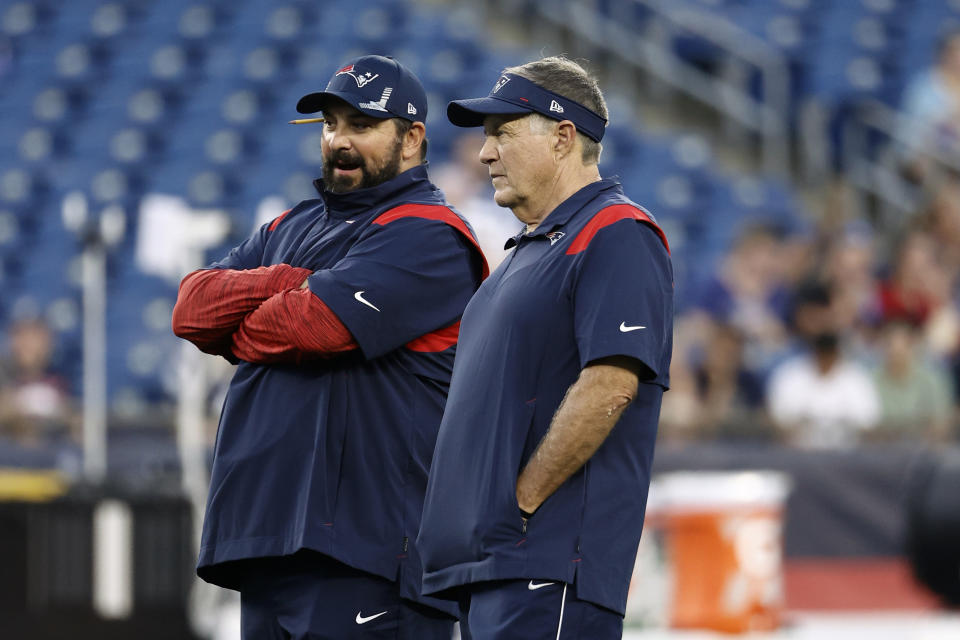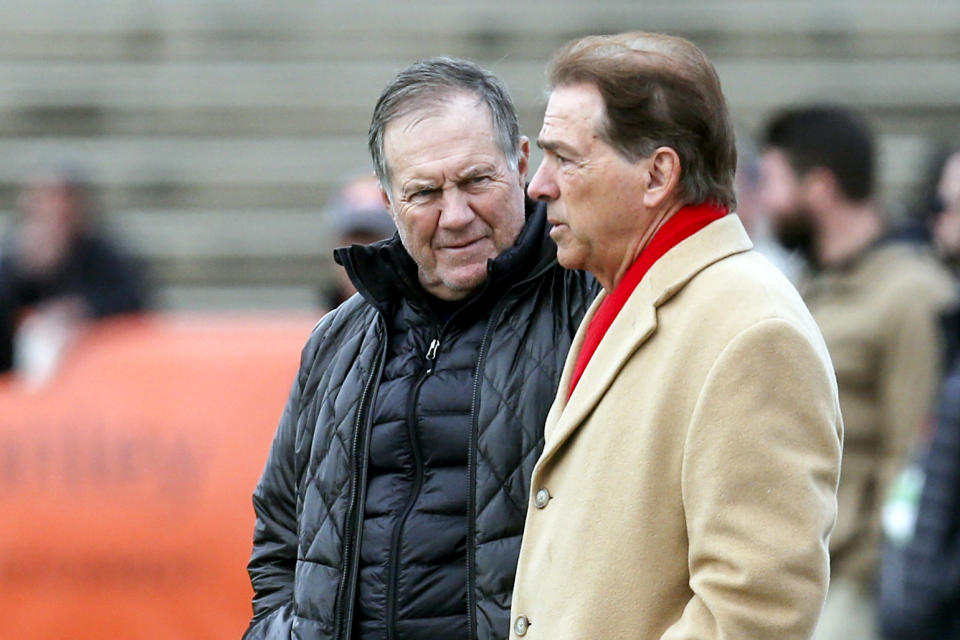One of Bill Belichick’s closest coaching confidants, and one of the few who can stand close to him in terms of accomplishment, is Alabama’s Nick Saban.
Each hails from a Croatian family that settled in the steel and coal towns of Western Pennsylvania and West Virginia. Both are sons of coaches and of similar demeanor. Back in the early 1990s, Belichick, now 70, employed Saban, now 71, as his defensive coordinator with the Cleveland Browns.
Where Belichick has dominated the NFL (six Super Bowl titles), Saban has done the same at the college level (seven national titles).
So maybe it is Saban who can serve as an example of what Belichick should do about the fact that his New England Patriots have run stagnant — a 2-5 slide kept them out of the playoffs for the second time in three seasons. The Pats will go four years without a postseason victory.
Tom Curran of NBCSports Boston reported Wednesday that Belichick and Patriots team owner Robert Kraft held a season-ending meeting and walked away in agreement that “changes” are necessary within the organization.
Belichick once ran the most efficient and ruthless winning machine the NFL has ever seen. Since quarterback Tom Brady left for Tampa Bay in 2020, however, New England has drifted. Despite the mediocrity, Belichick has mostly kept everything in-house by promoting from within or rehiring former assistants to come back into the fold. Two of his sons are assistant coaches as well.
This past season, New England lacked a named play-caller and appeared to lean mostly on longtime Belichick assistant (and former Detroit Lions head coach) Matt Patricia to coordinate the offense, despite a history on the defensive side of the ball. It didn’t turn out well.


At Alabama, Saban has never had a slide like his former boss is mired in. However, after winning consecutive national titles in 2011 and 2012, the Tide finished 11-2 in 2013. Saban could have brushed it off as nothing; Alabama was unbeaten until its regular-season finale, after all.
Instead, he saw the game around him changing. College offenses were now wide-open. The old ball control and win-with-defense style Saban had perfected was under a measure of threat. He understood the need to modernize.
So he went out and hired the most innovative offensive coordinator he could find: Lane Kiffin, who had just been fired as the head coach of USC. This was a wild move, one that sent college football reeling. Kiffin was known for the kind of brashness and antics that seemed like a bad fit for the conservative Saban. They had no previous relationship. Clashes were predicted (and they did, indeed, come).
Saban didn’t care. He wasn’t looking for a friend. He wasn’t looking for familiarity. First, he brought Kiffin in for a week to analyze Alabama’s offense — from recruiting to play-calling to practice sessions. Sufficiently convinced, he hired Kiffin to turn the Crimson Tide offense into something as feared as the Crimson Tide defense.
“We are excited to have Lane join our staff,” Saban said at the time. “He is an outstanding and creative offensive coach … and I have always been impressed with what I saw in the games he called.”
The Bama offense didn’t get exponentially better overnight; it was already pretty good, after all. It did improve, though, as the groundwork was put in place. Kiffin was there for only three seasons, but he changed the way talented recruits looked at Alabama’s offense. He was succeeded in the years to come by Josh Gattis and Steve Sarkisian, two other college coaches with no previous ties to Saban, and then current OC Bill O’Brien, who arrived from the NFL.
Whereas Alabama won previously with quarterbacks such as Greg McElroy and A.J. McCarron — good but not elite talents — soon the Tide were drawing in Jalen Hurts, Tua Tagovailoa, Mac Jones and Bryce Young. They began throwing to DeVonta Smith, Jerry Jeudy, Calvin Ridley, John Metchie, Henry Ruggs III, Jaylen Waddle and so on.


The Tide reached the national title game six times from 2015 to 2021, winning three championships. From 2018 to 2020, their offense was ranked in the top three in the country in points per game.
Saban’s willingness to see the challenges coming and listen to outside opinions from completely different personalities has helped maintain, if not even improve, his program.
It’s a path Belichick should consider following if these “changes” that he and Kraft agree on include shaking up his coaching staff. Football doesn’t lack innovative coaching minds, especially on offense. And Belichick is still Belichick. The chance to work with a legend of that caliber makes any job in Foxborough appealing.
The question is whether he is willing to identify what he needs and then hire that. Or will he stay the course and continue to look inward?
Nothing is guaranteed here, of course. A fresh perspective might fail. But if Belichick wants proof of concept of going far from the coaching tree in an effort to disrupt things via new ideas, voices and perspectives, then following his old friend in Tuscaloosa might be instructive.
